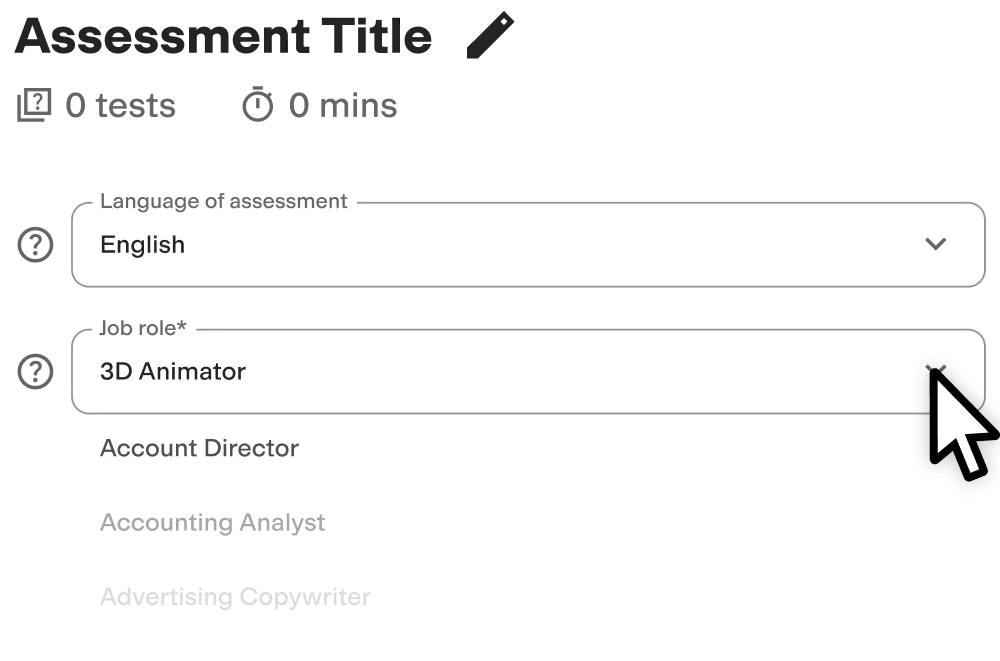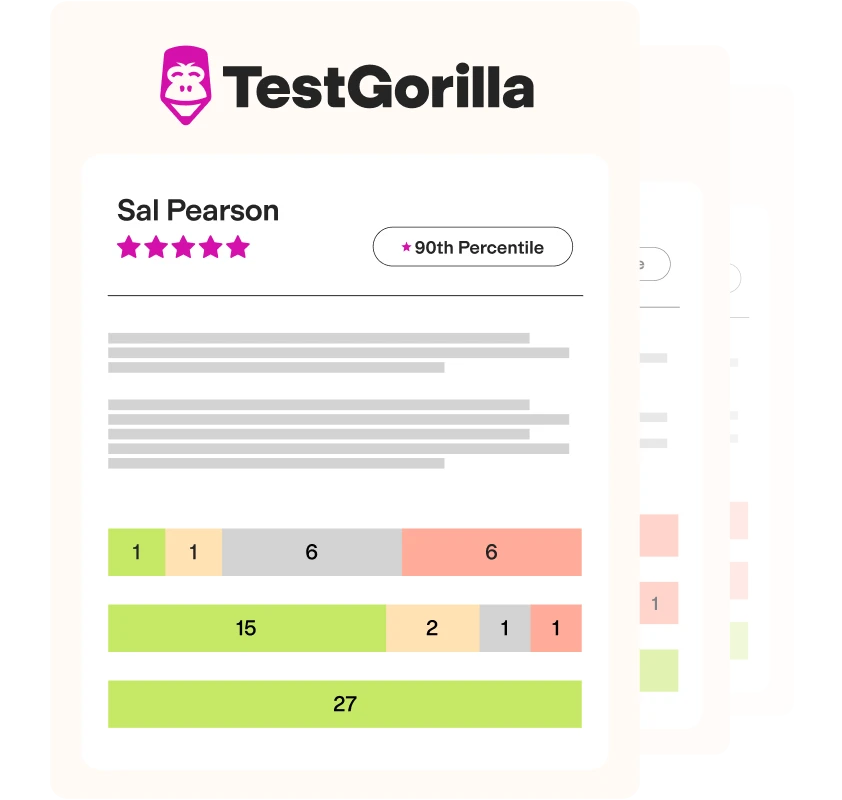Attention to Detail test: Pre-employment screening assessment to hire the best candidates
Summary of the Attention to Detail (Textual) test
This Attention to Detail pre-hire skills test evaluates candidates’ ability to pay attention to textual detail while processing information. The Attention to Detail (Textual) test helps companies identify candidates who can thoroughly and carefully handle intricate processes using analytical skills.
Covered skills
Matching information
Filtering information
Comparing statements for differences
Checking the consistency of information
Use the Attention to Detail (Textual) test to hire
Any role that requires attention to detail, such as customer care, office assistant, administrator, and bookkeeper, among others. This test is also well-suited for testing candidates’ overall focus for entry-level jobs.
About the Attention to Detail (Textual) test
Noticing little things can have a big impact. From grammatical mistakes that can give the impression of unprofessionalism to mistakes in numbers and data that can cause serious errors, paying attention to detail is an important skill for every professional to have.
This Attention to Detail (Textual) test evaluates candidates’ abilities to consider details by presenting them with tasks that require them to match or filter information, compare statements, and check the consistency of information. The test provides insights on candidates’ alertness by asking them to identify errors, omissions, or inconsistencies in the information presented.
Candidates who score well on this attention to detail test are able to process textual information and arrive at the correct answer without losing sight of small details that can have a big impact. If you’re looking for candidates who are thorough in their work and take careful consideration of everything before coming to a conclusion, this is the right test. This is a great test to include to check candidates' overall analytical skills.
For a similar test that uses visual elements and information to assess candidates' skills, check out our Attention to Detail (Visual) test.
The test is made by a subject-matter expert
Anirban C.
The global IT industry has benefited from Anirban’s talents for over two decades. With a flawless reputation that precedes him, Anirban has earned a status as a sought-after agile project manager and consultant. He’s worked internationally as a Senior Project Manager with companies such as Ericsson, IBM, and T-Mobile.
Anirban’s love for learning helps him keep his skills sharp. He holds an MBA and a degree in engineering, is a certified Scrum Master, and has certifications in Prince2 and ITIL.
Crafted with expert knowledge
TestGorilla’s tests are created by subject-matter experts. We assess potential subject-matter experts based on their knowledge, ability, and reputation. Before being published, each test is peer-reviewed by another expert, then calibrated using hundreds of test-takers with relevant experience in the subject.
Our feedback mechanisms and unique algorithms enable our subject-matter experts to constantly improve their tests.
What our customers are saying
TestGorilla helps me to assess engineers rapidly. Creating assessments for different positions is easy due to pre-existing templates. You can create an assessment in less than 2 minutes. The interface is intuitive and it’s easy to visualize results per assessment.

VP of engineering, mid-market (51-1000 FTE)
Any tool can have functions—bells and whistles. Not every tool comes armed with staff passionate about making the user experience positive.
The TestGorilla team only offers useful insights to user challenges, they engage in conversation.
For instance, I recently asked a question about a Python test I intended to implement. Instead of receiving “oh, that test would work perfectly for your solution,” or, “at this time we’re thinking about implementing a solution that may or may not…” I received a direct and straightforward answer with additional thoughts to help shape the solution.
I hope that TestGorilla realizes the value proposition in their work is not only the platform but the type of support that’s provided.
For a bit of context—I am a diversity recruiter trying to create a platform that removes bias from the hiring process and encourages the discovery of new and unseen talent.

Chief Talent Connector, small business (50 or fewer FTE)
Use TestGorilla to hire the best faster, easier and bias-free
Our screening tests identify the best candidates and make your hiring decisions faster, easier, and bias-free.
Watch what TestGorilla can do for you
Create high-quality assessments, fast
Building assessments is a breeze with TestGorilla. Get started with these simple steps.
View a sample report
The Attention to Detail (Textual) test will be included in a PDF report along with the other tests from your assessment. You can easily download and share this report with colleagues and candidates.
What is an attention to detail test?
An attention to detail test is an assessment or evaluation designed to measure an individual's ability to observe and accurately identify specific details within a given set of information or a task.
This type of test is commonly used in various fields, including but not limited to, job recruitment, quality control, data analysis, and problem-solving scenarios. Attention to detail is a crucial skill that involves being thorough, meticulous and focused on small elements or nuances that others may overlook.
The test may include tasks such as identifying errors in data, spotting patterns, analyzing visual information, or following detailed instructions. It aims to assess an individual's ability to maintain precision and accuracy while processing information.
Attention to detail in the workplace
As a skill, attention to detail can help employees follow complex processes or instructions while performing every step precisely. It also helps them complete tasks faster and more efficiently. Although errors happen in the workplace, some can have serious consequences. This is where attention to detail comes in, reducing or even removing some of the risks.
Being meticulous, careful, and accurate will help employees meet deadlines, root out errors and manage more effectively in stressful situations. People with impressive attention to detail tend to relay information accurately and concisely, and can often be trusted to work with reduced supervision.
Common workplace errors
We know people make mistakes: it happens all the time. However, errors in the workplace can carry risks. This means that the company could face uncertainties when conducting its daily business, and these uncertainties may affect productivity and costs. We can put errors that may cause risk in two categories:
• Skill-based errors: These are lapses or mistakes that occur when an employee performs a familiar task or activity. A lack of attention to detail is often one of the contributing factors to skill-based errors.
• Decision-based errors: These can happen when employees make unsound decisions because they do not have enough information or knowledge. Good attention to detail can help an employee gather the correct information to make a sound decision.
Where in my recruitment process should you use the Attention to Detail (Textual) test?
The Attention to Detail (Textual) test can be utilized at different stages of the recruitment process, depending on your specific needs and preferences. Here are a few points in the process where it can be beneficial:
1. Initial Screening: Consider incorporating the Attention to Detail test as an early screening tool to assess candidates' basic attention to detail skills. This helps you filter out applicants who may lack the necessary level of precision required for the role.
2. Pre-Interview Assessment: Administer the test to shortlisted candidates prior to conducting interviews. This allows you to further evaluate their ability to identify specific details and their attention to accuracy, providing valuable insights to inform your interview questions and discussions.
3. Skills Assessment: If attention to detail is a critical skill for the position, you can administer the test as part of a skills assessment phase. This helps gauge candidates' proficiency in reviewing and comprehending textual information with precision and meticulousness.
4. Final Evaluation: In the later stages of the recruitment process, when you have narrowed down your candidate pool, you can use the Attention to Detail test as a final validation tool. This ensures that the selected candidate possesses the required attention to detail skills before making a final hiring decision.
Remember, the specific placement of the Attention to Detail test in your recruitment process should align with the job requirements and the importance of attention to detail for the role.
Benefits of the Attention to Detail test
How do you go about recruiting for a position that requires attention to detail? As mentioned above, a good option is to use a science-backed assessment. Although an attention-to-detail exercise can help your recruitment process, an attention-to-detail test can give you deeper insights into candidates’ skills. And as a part of a pre-employment screening assessment, it can show you which candidates would be a good fit for the role. Some of the benefits include:
• Using accurate data, you can establish whether candidates have the required level of attention to detail for your role
• The data can help you to make reliable decisions if you have two strong candidates with similar skill sets
• Testing can remove the need to sort through dozens, if not hundreds, of resumes from candidates who all claim to have the required skills
Although assessing candidates isn't always simple, knowing if they are detail-oriented can be crucial to ensure they perform well in the role you’re recruiting for.
In summary
Recruiting for attention to detail can help you find candidates who can follow complex processes or instructions while performing every step precisely. By adding an attention-to-detail test to your recruitment process, you can see whether candidates are likely to avoid errors.
TestGorilla’s textual Attention to Detail test can help you hire for detail-oriented roles such as customer care, office assistant, administration, bookkeeping, or any position where you need to test overall focus for entry-level jobs.










